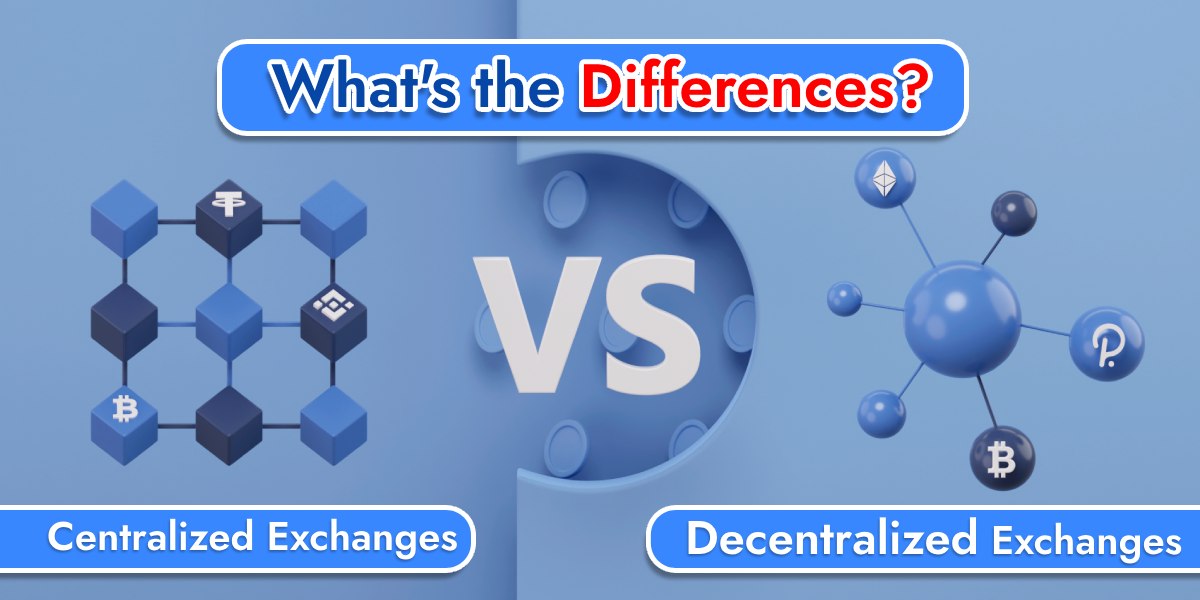The cryptocurrency market offers two main types of exchanges for trading digital assets: centralized exchanges (CEXs) and decentralized exchanges (DEXs). Each type caters to different user needs and preferences, and understanding their differences is crucial for both new and experienced traders.
Centralized Exchanges (CEXs)
Centralized exchanges are platforms that act as intermediaries between buyers and sellers. The platform is controlled by a centralized entity, like a company, which oversees its operations. Users of CEXs create accounts, deposit funds, and place orders through the exchange’s interface, which matches and executes trades.
Pros of CEXs:
- User-Friendly: CEXs often provide a more intuitive and easy-to-navigate interface, making them suitable for beginners.
- High Liquidity: Due to a larger user base, CEXs typically offer higher liquidity, facilitating faster trades and more stable prices.
- Variety of Services: Many CEXs offer additional services such as margin trading, futures, and options.
- Regulation: CEXs are usually subject to government regulations, which can provide a sense of security for users.
Cons of CEXs:
- Security Risks: Being centralized, these platforms can be targets for hacking and may suffer from security breaches.
- Custody of Assets: Users must trust the exchange with their funds, as CEXs control the private keys.
- Privacy Concerns: CEXs often require extensive Know Your Customer (KYC) procedures, which can compromise user anonymity.
Decentralized Exchanges (DEXs)
Decentralized exchanges operate without a central authority. Trades are executed directly between users (peer-to-peer) through an automated process using smart contracts on a blockchain.
Pros of DEXs:
- Security and Privacy: Users retain control over their private keys, reducing the risk of hacking and preserving anonymity.
- No Single Point of Failure: DEXs are less vulnerable to systemic risks since they do not rely on a central entity.
- Innovation: DEXs often pioneer new technologies and trading mechanisms within the blockchain space.
Cons of DEXs:
- Lower Liquidity: DEXs generally have less liquidity compared to CEXs, which can lead to higher price slippage.
- Complexity: The interfaces of DEXs can be more complicated, posing a challenge for less experienced users.
- Limited Customer Support: DEXs typically lack the customer support services that CEXs offer.
Also Know: Best Crypto Exchanges for Swing Trading
How Do Centralized and Decentralized Exchanges Differ in Terms of Security

Centralized exchanges (CEXs) and decentralized exchanges (DEXs) differ significantly in terms of security.
Centralized Exchanges Security
It is managed by a single entity, are often targeted by hackers because they hold large volumes of cryptocurrencies. Users must trust the exchange to safeguard their assets, as the exchange controls the private keys. If a CEX is compromised, users’ funds can be stolen. Additionally, insider threats from employees or contractors of the exchange can lead to unauthorized access and potential loss of funds. However, reputable centralized exchanges invest in advanced security measures to protect user funds and data. Some even provide insurance on deposited assets.
Decentralized Exchanges Security
On the other hand, decentralized exchanges offer a different security model. Users retain control over their private keys, reducing the risk of hacking and preserving anonymity. Transactions are automated by smart contracts, reducing the need for trust between trading parties. However, users are responsible for managing their digital assets and being aware of smart contract risks. You should have specific knowledge to use decentralized exchanges (DEXs) securely. This includes understanding how to use cryptocurrency wallets that can interact with smart contracts and keep funds secure.
In summary, while CEXs can provide advanced security measures and insurance, they are more vulnerable to hacking and require users to trust the exchange with their assets. DEXs, on the other hand, allow users to retain control of their assets and offer a trustless operation model but require a higher level of technical knowledge to use securely.
Decentralized Exchange Vs Centralized Exchange: Summary
| Aspect | Decentralized Exchange (DEX) | Centralized Exchange (CEX) |
|---|---|---|
| Control | Users have more control over their funds. | The platform holds users’ funds; less user control. |
| Speed | Aims for quicker and cheaper transactions. | Transactions might be slower and costlier. |
| Security | Potential for enhanced security through blockchain. | Generally perceived as more secure. |
| Intermediaries | Reduces reliance on intermediaries. | Requires intermediaries for transactions. |
| Risk | May involve some risks due to smart contract issues. | Generally considered less risky. |
| Popular Use | Growing popularity, especially in DeFi. | More widespread and popular. |
Examples of Centralized and Decentralized Exchanges
The cryptocurrency market is vast and diverse, offering various platforms for trading digital assets. These platforms fall into two main categories: centralized exchanges (CEXs) and decentralized exchanges (DEXs), each having its unique features and benefits. Here, we’ll explore some notable examples of both types of exchanges to provide a clearer understanding of the landscape.
Examples of Centralized Exchanges (CEXs)
Centralized exchanges are platforms that serve as intermediaries between buyers and sellers of cryptocurrencies. Central organizations manage it, like a company, and offer various services including spot trading, futures trading, and more. Here are some prominent examples:
- Coinbase: One of the most well-known centralized exchanges, Coinbase is renowned for its user-friendly interface, making it an ideal platform for beginners. It offers a wide range of cryptocurrencies for trading and is known for its regulatory compliance and security measures.
- Binance: Binance is the largest centralized exchange in terms of trading volume. It offers a vast array of cryptocurrencies and trading pairs, along with additional services like futures and options trading, lending, and more. Binance is known for its low trading fees and extensive ecosystem.
- Kraken: Kraken is another popular CEX that is known for its security and wide range of available cryptocurrencies. It offers spot trading, futures trading, and margin trading, catering to both beginners and experienced traders.
- Gemini: Founded by the Winklevoss twins, Gemini is a New York-based exchange that emphasizes regulatory compliance and security. It offers a clean, intuitive interface and a variety of cryptocurrencies for trading.
Examples of Decentralized Exchanges (DEXs)
Decentralized exchanges operate without a central authority, facilitating peer-to-peer trading directly between users. They are known for their emphasis on security, privacy, and user control. Here are some notable DEXs:
- Uniswap: Uniswap is one of the most popular DEXs, operating on the Ethereum blockchain. It uses an automated market maker (AMM) model to facilitate trading and is known for its ease of use and wide range of Ethereum-based tokens.
- PancakeSwap: Operating on the Binance Smart Chain, PancakeSwap is another AMM-based DEX that has gained popularity for its low transaction fees and fast transaction speeds. It offers a variety of features including yield farming and liquidity pools.
- Curve Finance: Curve is a DEX designed for stablecoin trading, offering low slippage and high liquidity for stablecoin pairs. It is built on the Ethereum blockchain and is popular among users looking for efficient stablecoin swaps.
- dYdX: dYdX is a decentralized platform that offers advanced trading options like margin trading, perpetual contracts, and borrowing/lending services. It is built on Ethereum and is designed for experienced traders seeking decentralized financial products.
Choosing The Right Exchange
The choice between a CEX and a DEX depends on the trader’s priorities. If ease of use, high liquidity, and additional trading services are important, a CEX might be the preferred option. On the other hand, if security, privacy, and control over one’s assets are paramount, a DEX could be more suitable.
Conclusion
Both centralized and decentralized exchanges play crucial roles in the cryptocurrency ecosystem, catering to different user needs and preferences. Centralized exchanges offer ease of use, high liquidity, and a range of services but require users to trust the platform with their funds. Decentralized exchanges, on the other hand, provide more control and security for users’ assets but may have a steeper learning curve and generally lower liquidity. Whether a trader chooses a CEX or a DEX depends on their specific requirements, including the level of security, control, and services they desire.



![Read more about the article Top 5 Uniswap Common Errors and Their Solutions [FIXED 100%]](https://www.cryptocustomercare.org/wp-content/uploads/2024/02/Common-Uniswap-Errors-300x150.jpg)